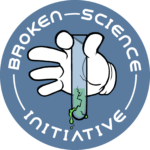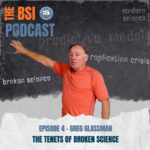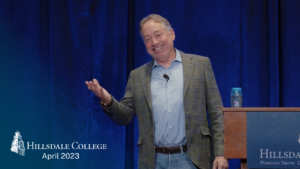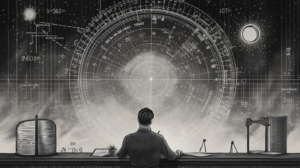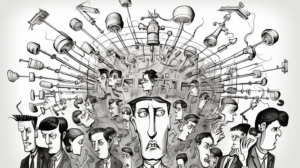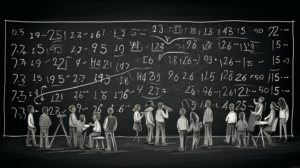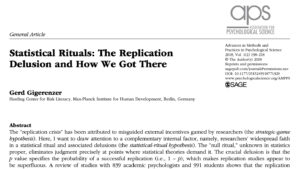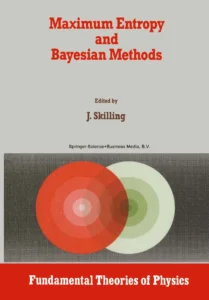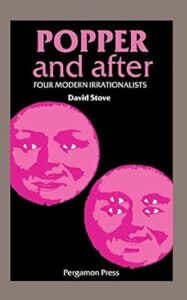
We look forward to seeing you in March. Below is a sampling of resources to familiarize yourself with what we plan to discuss at the event.
Wikipedia Articles
” I’m going to recommend a lot of Wikipedia articles and I couldn’t hate Wikipedia any more than anybody.
Everything important they’ve got wrong. But it is a reasonable place to start an introduction and have a discussion.”
– Greg Glassman.
• Principle of maximum entropy
• Cox’s theorem
• Plausible reasoning
• Probability interpretations
• Foundations of statistics
• Demarcation problem
Essential Reading
The BSI Manfiesto
Modern science is source and repository of man’s objective knowledge. Scientific knowledge is siloed in models. A model maps a fact to a future unrealized fact as a prediction. A fact is a measurement. A measurement is an observation tied to a scale with an expressed error. An observation is a registration of the real world on our senses or sensing equipment….
Breaking Down Broken Science
Science, once a beacon of objectivity, has become marred by corruption and misuse. At BSI, we are on a mission to unravel the tyranny of broken science and those who exploit it. In this week’s episode, we hear from Greg Glassman as he dives deep into the issues of broken science and addresses the consequences of research that will not replicate.
Why Most Research Findings Are False
There is increasing concern that most current published research findings are false. The probability that a research claim is true may depend on study power and bias, the number of other studies on the same question, and, importantly, the ratio of true to no relationships among the relationships probed in each scientific field.
Raise standards for preclinical cancer research
Efforts over the past decade to characterize the genetic alterations in human cancers have led to a better understanding of molecular drivers of this complex set of diseases. Although we in the cancer field hoped that this would lead to more effective drugs, historically, our ability to translate cancer research to clinical success has been remarkably low.
Breaking Down Broken Science
A talk given by BSI co-founder Greg Glassman in April 2023. Glassman explains, there are significant widespread issues within many areas of science, specifically within social sciences and medicine. In these areas, we are witnessing a shift towards pleasing gatekeepers and promoting industry interests. Glassman expresses his concern about the adverse impact this has had on medicine, as entire departments and fields have fallen victim to what he calls “epistemic debasement.”
Surrogate Science: The Idol Of A Universal Method For Scientific Inference
This editorial commentary by Gerd Gigerenzer and Julian Marewski discusses the dream of a universal method of inference in science. The great mathematician Gottfried Wilhelm Leibniz dreamed of a universal calculus in which all ideas could be represented by symbols and discussed without bickering. He predicted the project would take five years, but alas, has never been completed.
Gigerenzer – Fast And Frugal Heuristics
Heuristic decision making refers to mental shortcuts or ‘rules of thumb’ used by individuals to make swift decisions, particularly under pressure or when there is a lack of detailed information. This type of thinking has been criticized as a shortcut, prone to bias, and “predictably irrational”. This paper by Gerd Gigerenzer and Peter Todd shows that “fast and frugal” heuristic thinking can often yield better outcomes than time-intensive, deliberate thought processes. Sometimes, less information is better.
Gigerenzer – Mindless Statistics
Gerd Gigerenzer’s paper criticizes the lack of attention paid to effect sizes and the undue emphasis on null hypothesis testing in research. Despite the American Psychological Association’s recommendations, effect sizes are rarely reported, hindering the computation of statistical power in tests. It highlights a 1962 study by Jacob Cohen, which revealed that published experiments in a major psychology journal had only a 50% chance of detecting a medium-sized effect, yet this didn’t affect researchers’ attitudes towards effect sizes. In fact, 24 years later, an even smaller percentage of papers in the same journal mentioned statistical power.
Statistical Rituals: The Replication Delusion And How We Got There
Publish or perish, the null ritual, improper incentives, the inference revolution, illusions of certainty, statistical power. Gerd Gigerenzer looks back at trends in science to understand how the replication crisis came to be, particularly in his field of psychology and in biomedical science.
“Psychology departments need to begin teaching statistical thinking, not rituals, and journal editors should no longer accept manuscripts that report results as ‘significant’ or ‘not significant.’”
Trial and Error: The Supreme Court’s Philosophy of Science
Apparently equating the question of whether expert testimony is reliable with the question of whether it is genuinely scientific, in Daubert v Merrell Dow Pharmaceuticals, Inc (1993) the US Supreme Court ran together Karl Popper’s and Carl Hempel’s incompatible philosophies of science. But there can be no criterion discriminating scientific, and hence reliable, testimony from the unscientific and unreliable; for not all, and not only, scientific evidence is reliable.
Other Reading
Probability, Philosophy and Science: A briefing for Bayesians
The objective Bayesian view is considered in relation to philosophy and philosophy of science. Carnap’s distinction between logical and factual probabilities is rejected, as is an anti-Bayesian argument due to Popper. Reasons for the confusion are advanced. Inductive philosophy of science is defended, and a tentative methodology proposed. Four prominent anti-inductivists are analysed: Popper, Lakatos, Kuhn and Feyerabend. Popper is shown to have been misled by the problem of improper priors, in hypothesis space; his deductive doctrine of falsifiability is replaced by the inductive one of testability.
Popper and After: Four Modern Irrationalists
Popper and After: Four Modern Irrationalists focuses on a tendency in the philosophy of science, of which the leading representatives are Professor Sir Karl Popper, the late Professor Imre Lakatos, and Professors T. S. Kuhn and P. K. Feyerabend. Their philosophy of science is in substance irrationalist. They doubt, or deny outright, that there can be any reason to believe any scientific theory; and a fortiori they doubt or deny, for example, that there has been any accumulation of knowledge in recent centuries.
